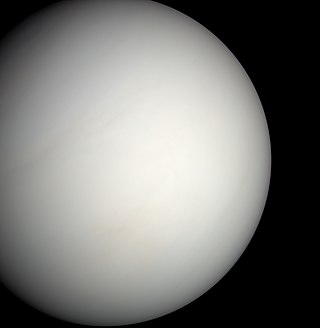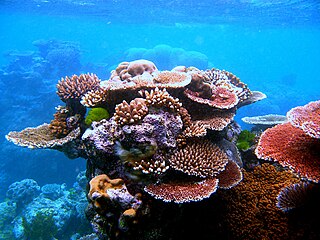Related Research Articles

An island or isle is a piece of subcontinental land completely surrounded by water. Very small islands such as emergent land features on atolls can be called islets, skerries, cays or keys. An island in a river or a lake island may be called an eyot or ait, and a small island off the coast may be called a holm. Sedimentary islands in the Ganges Delta are called chars. A grouping of geographically or geologically related islands, such as the Philippines, is referred to as an archipelago.

A planet is a large, rounded astronomical body that is neither a star nor its remnant. The best available theory of planet formation is the nebular hypothesis, which posits that an interstellar cloud collapses out of a nebula to create a young protostar orbited by a protoplanetary disk. Planets grow in this disk by the gradual accumulation of material driven by gravity, a process called accretion. The Solar System has at least eight planets: the terrestrial planets Mercury, Venus, Earth, and Mars, and the giant planets Jupiter, Saturn, Uranus, and Neptune.

Space exploration is the use of astronomy and space technology to explore outer space. While the exploration of space is currently carried out mainly by astronomers with telescopes, its physical exploration is conducted both by uncrewed robotic space probes and human spaceflight. Space exploration, like its classical form astronomy, is one of the main sources for space science.

Space colonization is the use of outer space or celestial bodies other than Earth for permanent habitation or as extraterrestrial territory.

Venus is the second planet from the Sun. It is a terrestrial planet and is the closest in mass and size to its orbital neighbour Earth. Venus is notable for having the densest atmosphere of the terrestrial planets, composed mostly of carbon dioxide with a thick, global sulfuric acid cloud cover. At the surface it has a mean temperature of 737 K and a pressure of 92 times that of Earth's at sea level. These conditions are extreme enough to compress carbon dioxide into a supercritical state close to Venus's surface.

Corals are colonial marine invertebrates within the class Anthozoa of the phylum Cnidaria. They typically form compact colonies of many identical individual polyps. Coral species include the important reef builders that inhabit tropical oceans and secrete calcium carbonate to form a hard skeleton.

The Bahamas are a group of about 700 islands and cays in the western Atlantic Ocean, of which only between 30 and 40 are inhabited. The largest of the islands is Andros Island, located north of Cuba and 200 kilometres southeast of Florida. The Bimini islands are to its northwest. To the North is the island of Grand Bahama, home to the second-largest city in the country, Freeport. The island of Great Abaco is to its east. In the far south is the island of Great Inagua, the second-largest island in the country. Other notable islands include Eleuthera, Cat Island, San Salvador Island, Acklins, Crooked Island, and Mayaguana. Nassau is the capital and largest city, located on New Providence. The islands have a tropical savannah climate, moderated by the Gulf Stream. The total size is 13,878 km2 (5,358 sq mi). Due to the many widespread islands it has the 41st largest Exclusive Economic Zone of 654,715 km2 (252,787 sq mi).

The Great Barrier Reef is the world's largest coral reef system, composed of over 2,900 individual reefs and 900 islands stretching for over 2,300 kilometres (1,400 mi) over an area of approximately 344,400 square kilometres (133,000 sq mi). The reef is located in the Coral Sea, off the coast of Queensland, Australia, separated from the coast by a channel 160 kilometres (100 mi) wide in places and over 61 metres (200 ft) deep. The Great Barrier Reef can be seen from outer space and is the world's biggest single structure made by living organisms. This reef structure is composed of and built by billions of tiny organisms, known as coral polyps. It supports a wide diversity of life and was selected as a World Heritage Site in 1981. CNN labelled it one of the Seven Natural Wonders of the World in 1997. Australian World Heritage places included it in its list in 2007. The Queensland National Trust named it a state icon of Queensland in 2006.

A coral reef is an underwater ecosystem characterized by reef-building corals. Reefs are formed of colonies of coral polyps held together by calcium carbonate. Most coral reefs are built from stony corals, whose polyps cluster in groups.

James William Buffett was an American singer-songwriter. He was known for his tropical rock sound and persona, which often portrayed a lifestyle described as "island escapism" and promoted enjoying life and following passions. Buffett recorded many hit songs known as "The Big 8": "Margaritaville" (1977), which is ranked 234th on the Recording Industry Association of America's list of "Songs of the Century"; "Come Monday" (1974); "Fins" (1979); "Volcano" (1979); "A Pirate Looks at Forty" (1974); "Cheeseburger in Paradise" (1978); "Why Don't We Get Drunk" (1973); and "Changes in Latitudes, Changes in Attitudes" (1977). His other popular songs include "Son of a Son of a Sailor" (1978), "One Particular Harbour" (1983), and "It's Five O'Clock Somewhere" with Alan Jackson (2003). Buffett formed the Coral Reefer Band in 1975.

Garth Richard Nix is an Australian writer who specialises in children's and young adult fantasy novels, notably the Old Kingdom, Seventh Tower and Keys to the Kingdom series. He has frequently been asked if his name is a pseudonym, to which he has responded, "I guess people ask me because it sounds like the perfect name for a writer of fantasy. However, it is my real name."

Jack DeJohnette is an American jazz drummer, pianist, and composer.

Michael Jay Feinstein is an American singer, pianist and music revivalist. He is an archivist and interpreter for the repertoire known as the Great American Songbook. In 1988 he won a Drama Desk Special Award for celebrating American musical theatre songs. Feinstein is also a multi-platinum-selling, five-time Grammy-nominated recording artist. He is the artistic director for The Center for the Performing Arts in Carmel, Indiana.

Jason Moran is an American jazz pianist, composer, and educator involved in multimedia art and theatrical installations.

"Where Corals Lie" is a poem by Richard Garnett which was set to music by Sir Edward Elgar as the fourth song in his song-cycle Sea Pictures. The poem was first published in Io in Egypt and other poems in 1859 and subsequently anthologized in Sea Music in 1888.

Luís Remo de Maria Bernardo Fernandes, known professionally as Remo Fernandes, is a Portuguese singer and musician. Known as a pioneer of Indian pop music, he performs pop/rock/Indian fusion and is also a film playback singer. His musical work is a fusion of many different cultures and styles that he has been exposed to as a child in Goa and in his later travels around the world. Such influences include Goan and Portuguese music, Sega music, African music, Latin music, the music of erstwhile European communist states, those of the dance halls from Jamaica and Soca.
Cahill is a name of Irish origin. It is the anglicised version of the Gaelic "Ó Cathail" meaning "descendant of Cathal".

No worries is an expression seen in English meaning "do not worry about that", "that's all right", "forget about it" or "sure thing". It is similar to the American English "no problem". The phrase is widely used in Australian and New Zealand speech and represents a feeling of friendliness, good humour, optimism and "mateship" in Australian culture. The phrase has been referred to as the national motto of Australia.
Edward Cahill was an Australian concert pianist. He was born 1885 in Beenleigh, Queensland and died 1975 in Monaco. Highly regarded and widely travelled in his day, his name has since fallen into obscurity. The author Michael Moran, his grand nephew, has written a biography of Cahill, entitled The Pocket Paderewski: The Beguiling Life of the Australian Concert Pianist Edward Cahill.
Edward Cahill may refer to:
References
- ↑ Moran, Michael (1998). Point Venus. Rose Bay, N.S.W. : Brandl & Schlesinger. ISBN 9781876040086.
- ↑ "Michael Moran". www.michael-moran.net. Retrieved 16 June 2019.
- ↑ MacLean, Rory (6 May 2008). "Magnetic Poles". The Guardian. ISSN 0261-3077 . Retrieved 16 June 2019.
- ↑ Mansfield, Paul (30 May 2008). "A Country in the Moon: Book review". ISSN 0307-1235 . Retrieved 16 June 2019.
- ↑ "A Country in the Moon, by Michael Moran" . The Independent. 16 May 2008. Archived from the original on 14 May 2022. Retrieved 16 June 2019.